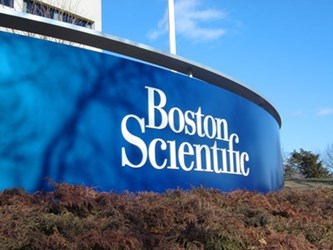Boston Scientific Ramping Up Watchman, S-ICD Programs
By Jof Enriquez,
Follow me on Twitter @jofenriq

Boston Scientific is ramping up its Watchman anti-stroke device program in anticipation of a National Coverage Determination from the Centers for Medicare & Medicaid Services (CMS). The device maker also is optimistic that it will reverse a decline in cardiac rhythm management (CRM) sales by the end of 2016, based partially on growing adoption of its Subcutaneous Implantable Cardioverter Defibrillator (S-ICD) system.
Watchman received FDA approval last year for patients with atrial fibrillation who are unable or unwilling to take standard warfarin therapy. Boston Scientific announced this week that the Centers for Medicare and Medicaid Services (CMS) will cover percutaneous left atrial appendage closure (LAAC) therapy under specific criteria, as outlined in the agency's final National Coverage Determination (NCD). The decision goes into effect immediately.
"In the U.S., we opened more than 100 WATCHMAN accounts in 2015 and expect to open an additional 100 accounts in 2016. In Europe, we're looking forward to a full launch of our second-gen WATCHMAN FLEX which already has CE Mark," Boston Scientific CEO Michael F. Mahoney said during a conference call. "As for U.S. reimbursement, we await a final NCD decision from CMS by Feb. 8 and we remain confident that WATCHMAN will represent at least a $500 million worldwide market opportunity."
Watchman, along with the Lotus aortic valve, drove up the company's Structural Heart business, under the Interventional Cardiology division, which posted 6 percent revenue growth during the past quarter. All other businesses grew organic revenue by at least 6 percent, led by 10 percent growth in Peripheral Interventions, according to Mahoney. However, global CRM sales declined 1 percent, as forecast, due to replacement cycles and competitive launches.
Analysts said Boston Scientific's CRM business has been hurt due to competition from Medtronic, according to Reuters. Medtronic received U.S. approval for the first MRI-compatible pacemaker in 2011, after which rivals Boston Scientific and St. Jude Medical have been losing market share.
Mahoney, however, was optimistic that the company will reverse the decline in CRM in the second half of 2016 as replacement cycles moderate, and new MRI-safe defibrillators and pacemakers launch and gain clearance in the U.S. and Japan. He expressed high hopes about the prospects of the company's EMBLEM S-ICD System, the first subcutaneous ICD to receive CE-Mark and FDA approvals.
"In the U.S., we plan to launch our full X4 Quad system with our Accolade Brady MRI safe system in the first half and EMBLEM MRI safe in the second half of 2016," Mahoney told analysts. "We continue to be pleased with our de novo ICD performance and the EMBLEM S-ICD in particular. EMBLEM continues to drive strong growth and de novo share gains in both Europe and the U.S. EMBLEM is building momentum globally and we look forward to launching EMBLEM in Japan this quarter with a reimbursement premium and expanding S-ICD to additional international markets in 2016."
Boston Scientific's Synergy drug-eluting stent is another growth driver in 2016. "We're launching SYNERGY in Japan and we'll continue to expand SYNERGY in other international markets. We also continue to invest in building upon the strong clinical evidence for SYNERGY as we have initiated the EVOLVE short DAPT study," said Mahoney, who expects 50-50 share from the U.S. and Japan markets by the end of the year.
Regarding the impact of the medical device tax suspension, company CFO Daniel J. Brennan said they will "reinvest virtually all of the benefit into jobs, innovation, R&D, collaborations with universities and other initiatives."
On M&A plans, Brennan said they are looking at different opportunities, and are "actively in the market obviously looking for tuck-in deals." Boston Scientific last year bought American Medical Systems' (AMS) men’s health product portfolio, and company executives told analysts that companies' integration is on track.
Boston Scientific reported fourth quarter operational revenue growth of 23 percent in MedSurg (7 percent organic), 7 percent operational and organic revenue growth in Cardiovascular, and flat sales on an operational and organic basis in Rhythm Management. Fourth quarter sales jumped 10 percent to $1.978 billion, and full year sales grew 8 percent to $7.477 billion.
